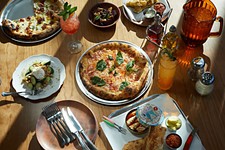A Patchwork Planet
How blogging became the (very lucrative) 21st century quilting bee
By Melanie Haupt, Fri., March 2, 2012
Back in 2000, I was living in Houston, working for a dot-com and missing my family. Because I didn't have much of a social network in the city and was working long hours, I started a little GeoCities journal to keep in touch with my far-flung friends, trade quips and mild insults with my dad and brother, and spew my opinions about the new music and movies I reviewed for my job. When I moved to Boulder, Colo., the next year, my silly little journal (we weren't really calling them blogs back then) was even more of a lifeline for me as I processed my feelings about 9/11 and graduate school and wrote really, really bad poetry about my new boyfriend. What I didn't know then was that I was participating in a cultural trend with surprising roots. When women took to the Web to share their lives with others, they inserted themselves into a long history of alternative forms of personal and political expression.
A few years ago, the New England Quilt Museum in Lowell, Mass., featured an exhibit called "Women's Writes: Signature Quilts and Their Stories." The exhibit showcased a dozen or more quilts from the late 19th and early 20th centuries, assembled and signed by women, often in the interest of fundraising for social concerns like temperance, abolition, and the Red Cross. Quilt historian Ricky Clark, in a symposium paper dedicated to 19th century signature quilts, argues that "women made friendship or album quilts to reify community. By making them, women transformed personal relationships into visible, tangible form." The women who made these signature quilts used the tools available to them to represent themselves and their concerns with a material object as the evidence that would outlive them.
Anne L. Bower, in the introduction to Recipes for Reading, briefly makes the connection between quilts and cookbooks as readable material artifacts of women's lives. Bower argues that it was through the community cookbook that women, marginalized within their contemporary cultural contexts by the virtue of their gender (and, in the case of The Black Family Dinner Quilt Cookbook, their race), found a way to build community while also participating in American public life. The essays collected in Recipes for Reading help to situate women, via these cookbooks, within their cultural, political, and moral landscapes, bringing their various values – from expressions of local culture to philanthropic concerns to civil rights legislation – as communities and as individuals into relief.
With this evidence in mind, it is not too hard to accept that the distance between a 19th century quilting bee and women's blogs – particularly "mommy blogs" – is not that great. Like quilts and cookbooks, blogging gives women a voice they might not otherwise feel like they have. "Mothers have traditionally not had the access to or, arguably, the cultural permission to access, the means of broadcasting and sharing their stories publicly on a mass scale," says Catherine Connors, author of Her Bad Mother (www.herbadmother.com) and the director of community & social good at Babble.com. "Mom blogs and the mom-blogging community is the public space in which mothers' stories are shared, and as long as there is a demand for those stories, these will thrive."
The stories to be found on women's blogs are myriad: Women blog about quilting, sharing recipes, couponing, fashion, design, and tech. But they also blog about marriage, birth, miscarriages, abortions, divorce, depression, and death. Many bloggers are able to harness the power and support of their online communities to process their experiences and pursue justice. Most notably, Katie Granju of www.mamapundit.com blogged about the brutal beating and drug overdose that resulted in the slow, wrenching death of her teenage son Henry in 2010 and used her digital support system to crusade for answers for the unanswered questions surrounding his death. Regardless of a woman blogger's genre, women are cultivating and documenting their communities and their passions, an online phenomenon that has translated into big bucks for marketers looking for creative ways to promote their brands.
And therein lies the rub: What is at stake when women monetize their stories? What does it mean for the community, not to mention the integrity of the stories contained on any given woman's blog, if the blog is tarted up to look like a NASCAR driver's racing uniform? You don't see many 19th century quilts with advertisements for grocers and milliners emblazoned on the squares. Similarly, community cookbooks were meant to raise money for religious communities or charitable concerns through sales rather than through advertising revenue. And, let's face it: Quilting, cooking, scrapbooking, and blogging are all girl stuff. Who cares about that shit anyway?
Well, for one thing, there is money to be made for both the blogger and those who advertise on blogs. Heather Armstrong, the blogger behind the humorous memoir site Dooce.com, attracts tens of thousands of clicks each day and, at the height of her popularity, pulled down a high six-figure income, if not more. Ree Drummond of Pioneer Woman fame has turned what started out as a personal blog into a multimillion-dollar lifestyle portal, as well as two cookbooks, a memoir, a children's book centered on her beloved bassett hound, and a cooking show on the Food Network. Indeed, opportunities for professionalization within the women's blogosphere abound, suggesting that perhaps women have finally found a form of personal expression that is not relegated to the margins of culture.
"Bloggers can make a big impact with a brand even if they're not famous," says Indiana Adams of the fashion blog Adored Austin (www.adoredaustin.com) and founder of the Texas Style Council. "[Brands] are not just seeking out the Top 10 most famous bloggers. They're seeking out people who are making an impact in their community." Perhaps a woman is blogging about cooking using ingredients exclusively from her community-supported agriculture box, which generates an ongoing conversation within her local and digital community about sustainability and the pleasures of eating seasonally. A brand might approach that blogger about writing a review of its product, even if it is only tangentially related to food. And, because women bloggers are very good at talking to each other, they also have the power to make or break a brand online.
"Moms are a very important market. Studies show again and again that moms make most purchasing decisions for the household. Moms hold the purse strings," explains Connors, whose métier is mommy-blogging. "More importantly, because of the way that the mom blog community has developed, moms have become expert networkers and marketers themselves. They're the marketers and the market, and they know how to reach each other better than anybody." Take, for example, an incident in 2009 when Armstrong used her platform as a blogger with more than a million Twitter followers to get Maytag to repair a defective washing machine; besides having her own needs met, Armstrong was also able to get a brand-new washer and dryer donated to a local shelter. Now, most bloggers don't have access to that kind of power, but if you've got a network, you've got influence. And if you've got influence, you've got earning potential. You just have to recognize it.
"A lot of times women undersell themselves in the blogging world. They think, 'Oh, I would love to do this review for this product in exchange for the product,'" says Adams. "I would hope that we could all raise the bar and say, 'Here's what this kind of material is worth, and here's what magazines charge for it and here's my traffic and my impact and here's how I deserve to be paid as a professional.' I'd like to see a bigger trend of women taking a stand and saying, 'My services are valuable and I'm worthy to be paid for this kind of work,' instead of saying, 'I'll just do it for a free sweater!'"
In this age of global connectivity, girl stuff has found a voice that has been sanctioned by the marketplace, which women can leverage to turn a hobby into a career should they choose to. What the Internet and blogging have wrought is the full realization of the power of women's voices, where they don't have to camouflage their beliefs amidst hundreds of tiny stitches or in the subtext of a recipe's method.
Related Panels
Monetizing Mommy
Saturday, March 10, 5pm
Sheraton Austin, Capitol View North
#MommyMoney
Blogging: Why So Many Women Are Doing It
Monday, March 12, 5pm
InterContinental Stephen F. Austin, Assembly Room
#ladyblogs













